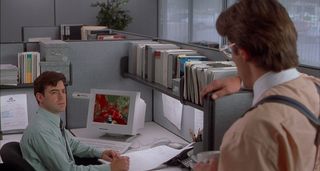In Kate Beaton's excellent autobiographical comic Ducks: Two Years in the Oil Sands (opens in new tab), there's a moment where an older worker asks for help with his emails. They're all coming out with weird gaps in them, so he turns to Beaton, a tech-savvy young person, for help. She explains the problem: he's been adding breaks by pressing enter at the end of each line because he's used to typewriters and doesn't realize the computer handles line breaks on its own. It's a touching moment of bonding in an otherwise pretty grim story.
It's not the kind of thing that happens in the offices of today, according to a report by The Guardian (opens in new tab). In fact, it's sometimes the other way around, with one 25-year-old publicist saying he turned to older workers who were veterans of the copy room for help. "Things like scanners and copy machines are complicated," Garrett Bemiller said, explaining that his first time using the photocopier in his New York office, "It kept coming out as a blank page, and took me a couple times to realize that I had to place the paper upside-down in the machine for it to work."
According to a survey of adults aged 18–26 by Dell (opens in new tab), "More than 1/3 of Gen Z feel that their school education did not prepare them with the technology skills needed for their planned career. 56% received either very basic or no digital skills training."
While the popular image of young people is digital natives who know how all technology works, it's a narrow stereotype. A generation who grew up using apps on their phones and owning laptops aren't going to magically know how to use the scanner, printer, or workhorse desktop PC in the office, which is why we end up with posts on the Sysadminhumor subreddit (opens in new tab) about having to label the power button. It reminds me of the time, while doing work experience in high school, I was asked to send a fax—something I'd never done in my life.
"When I see a printer, I'm like, 'Oh my God,'" Max Simon, a 29-year-old content creator told The Guardian. "It seems like I'm uncovering an ancient artifact, in a way." At 29, Simon's old enough to know more than his younger coworkers, however. "I'll invite them to a Google Meet, and they'll say, 'How do we get a link to that?' But the link is already in the calendar invite," he said. "Like, it's 2023, this is the world that we live in. Things that seem pretty straightforward often catch Gen Z off-guard."
As the millennial went on to say, "It takes five seconds to learn how to use TikTok. You don't need an instruction book, like you would with a printer. Content is so easy to access now that when you throw someone a simple curveball, they'll swing and they miss, and that's why Gen Z can't schedule a meeting."
We've previously seen college professors say students don't know what files and folders are thanks to the obfuscated file systems of smartphones and Apple devices as well as the power of modern search bars. And our own Evan Lahti noted that simple keyboard shortcuts broke the brains of his Gen Z coworkers, as things those of us who were taught to use word processors at school learned seem not to be part of the curriculum any more.
On a positive note, young employees do have an advantage when it comes to dealing with the office computer, even with its external hardware and unfamiliar interface. "Gen Z is very comfortable navigating software they’ve never used before, because they've been doing it their whole lives," Steve Bench, who runs corporate workshops on generational differences told The Guardian. "They are used to trial and error. They may not be this godsend to the workforce who come in automatically knowing how to do Excel, but they're fast learners."